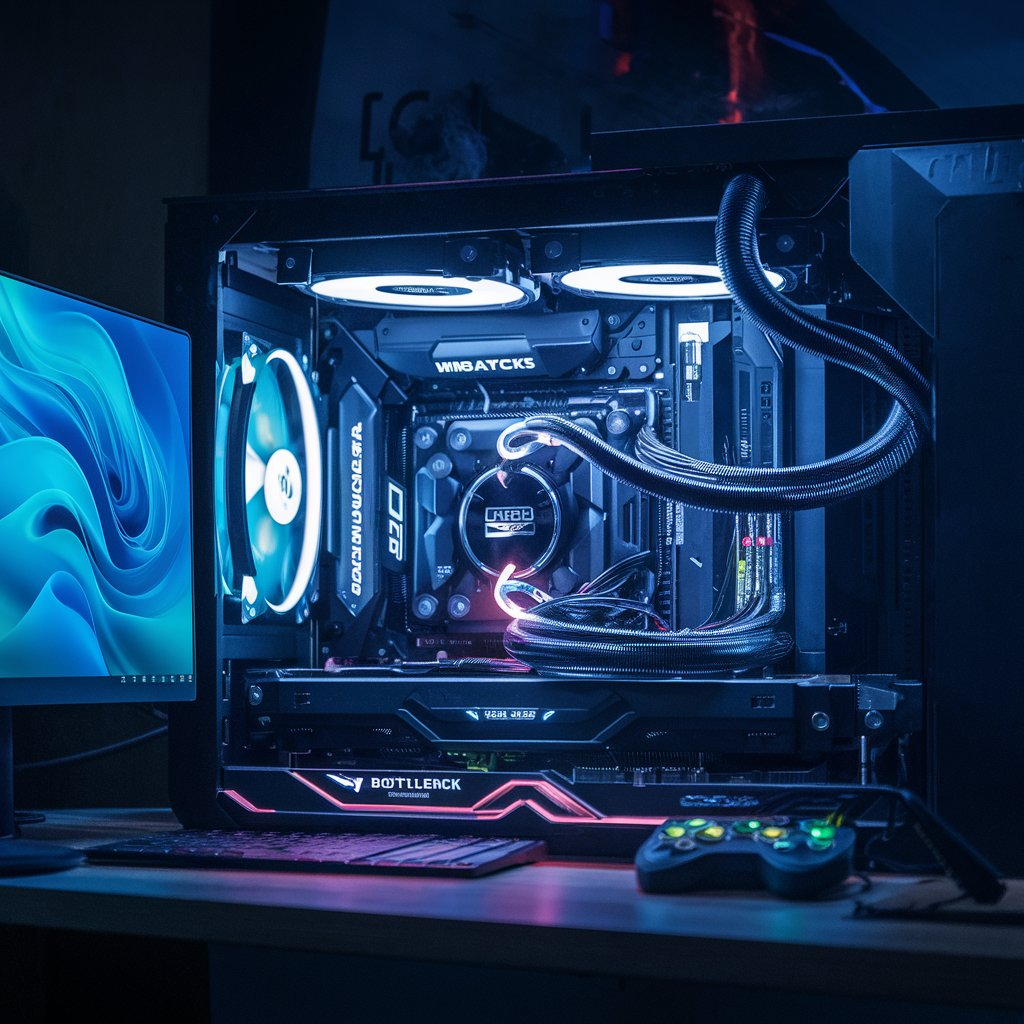Introduction
What is a Bottleneck Calculator?
A bottleneck calculator is a handy tool for tech enthusiasts and gamers. It helps identify mismatches between your computer’s components, specifically the CPU and GPU. This tool compares their performance levels and shows if there’s a bottleneck and its extent, ensuring your system runs smoothly.
Importance of Identifying Bottlenecks
Identifying bottlenecks is crucial for maintaining optimal performance. When one component limits the capabilities of others, it can lead to sluggish performance, especially in demanding tasks like gaming or video editing. Understanding and addressing these issues can significantly enhance your system’s efficiency.
Understanding Bottlenecks
In computing, a bottleneck occurs when one component of the system cannot keep up with the others, causing a slowdown. It’s like a traffic jam where one lane is slower than the rest, causing delays for everyone.
Bottlenecks often arise from imbalances between the CPU and GPU. For instance, a powerful GPU paired with an outdated CPU can result in subpar performance. Similarly, insufficient RAM or slow storage drives can also create bottlenecks.
How a Bottleneck Calculator Works
A bottleneck calculator works by analyzing the performance potential of your CPU and GPU. It evaluates how well these components can handle specific tasks and identifies any mismatches.
The calculator looks at several metrics, including clock speeds, core counts, and benchmark scores. By comparing these, it provides a clear picture of which component is underperforming and by how much.
CPU vs. GPU Performance
Role of the CPU
The CPU, or Central Processing Unit, is the brain of your computer. It handles general tasks and manages instructions for various applications. A strong CPU is essential for tasks that require a lot of processing power, such as rendering and simulations.
Role of the GPU
The GPU, or Graphics Processing Unit, is specialized for handling graphics and parallel processing tasks. It’s crucial for gaming, video editing, and other graphic-intensive applications. A high-performance GPU ensures smooth visuals and faster rendering times.
Signs of a Bottleneck
If your computer struggles with lag, slow load times, or stuttering during tasks, it might be experiencing a bottleneck. These issues often indicate that one component cannot keep up with the demands placed on it.
Common symptoms of a bottleneck include high CPU or GPU usage while the other component remains underutilized. Monitoring software can help identify these patterns, providing clues about which component is causing the issue.
Using a Bottleneck Calculator
Using a bottleneck calculator is straightforward. Enter the specifications of your CPU and GPU into the tool. The calculator will then analyze their performance and provide a detailed report on potential bottlenecks.
There are several online bottleneck calculators available, such as PC-Build’s Bottleneck Calculator and Bottlenecker. These tools are user-friendly and offer quick insights into your system’s performance.
Interpreting Results
The results from a bottleneck calculator typically show a percentage indicating the extent of the bottleneck. A higher percentage means a more significant performance issue. The tool may also provide recommendations for upgrades.
Once you have the results, you can decide on the best course of action. This might involve upgrading your CPU, GPU, or other components to balance the performance and eliminate the bottleneck.
Benefits of Using a Bottleneck Calculator
Improved System Performance
By identifying and addressing bottlenecks, you can significantly enhance your system’s performance. This leads to smoother gameplay, faster rendering times, and an overall better user experience.
Cost-Effective Upgrades
A bottleneck calculator helps you make informed decisions about upgrades. Instead of replacing your entire system, you can target specific components that need improvement, saving you money in the long run.
Limitations of Bottleneck Calculators
While useful, bottleneck calculators are not always 100% accurate. They provide estimates based on available data, and real-world performance can vary. Always consider these results as a guideline rather than a definitive answer.
Bottlenecks are not solely caused by CPU and GPU mismatches. Other factors, such as RAM capacity, storage speed, and cooling solutions, also play a role in system performance. Ensure a holistic approach when diagnosing performance issues.
Real-World Applications
Gaming
Gamers often face bottlenecks, especially when running high-demand titles on outdated hardware. Using a bottleneck calculator can help them optimize their setup for better frame rates and smoother gameplay.
Professional Workstations
For professionals using resource-intensive applications like video editing or 3D rendering, identifying bottlenecks is crucial. Ensuring balanced performance can lead to more efficient workflows and faster project completion.
Examples
Example 1: Gaming Rig
Consider a gaming setup with a high-end GPU and a mid-range CPU. A bottleneck calculator might reveal that the CPU is limiting the GPU’s performance, suggesting an upgrade to a more powerful processor.
Example 2: Video Editing Setup
In a video editing workstation, a bottleneck calculator might show that the system’s RAM is insufficient for handling large files, recommending an upgrade to increase memory capacity and improve editing speeds.
Tips for Optimizing System Performance
Hardware Upgrades
Upgrading components such as the CPU, GPU, RAM, and storage can alleviate bottlenecks. Ensure that new components are compatible with your existing setup to maximize performance gains.
Software Tweaks
Optimizing software settings, updating drivers, and managing background processes can also help improve system performance. Regular maintenance, such as cleaning up temporary files and defragmenting drives, is essential.
Conclusion
Understanding bottlenecks and using a bottleneck calculator can significantly improve your computer’s performance. By identifying mismatched components, you can make informed upgrade decisions and optimize your system.
Investing time in diagnosing and addressing bottlenecks can lead to a smoother, more enjoyable computing experience. Whether you’re a gamer or a professional, ensuring balanced performance is key to getting the most out of your hardware.



